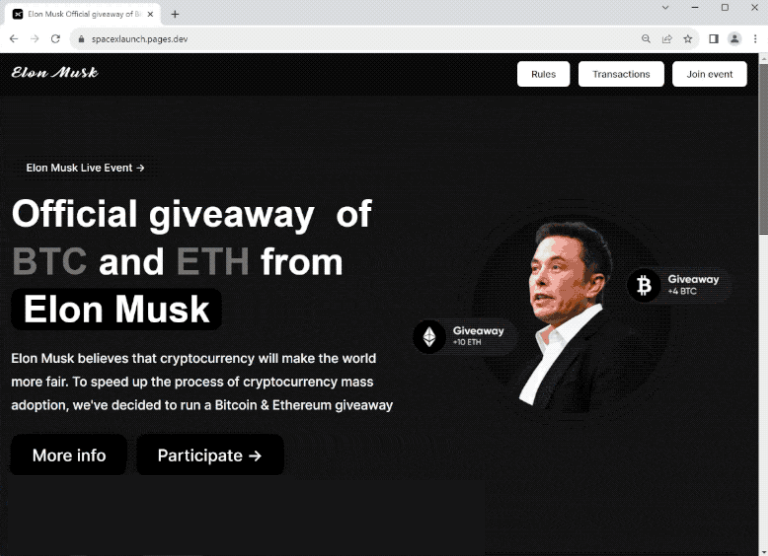What is the “Elon Musk Crypto Giveaway” scam
“Elon Musk Crypto Giveaway” is a generic scam that promises to double any amount of cryptocurrency users send to the provided wallet addresses. The scam uses Elon Musk’s name to promote the scam. It needs to be stressed that this and similar giveaways are scams, and users who send cryptocurrencies will receive nothing in return.
The “Elon Musk Crypto Giveaway” scam is just one out of thousands. These types of scams are incredibly prevalent, often encountered on social media platforms like X (formerly Twitter), as well as video-sharing services like YouTube. These scams are disguised as crypto giveaways and invite users to send any amount of cryptocurrency to the provided wallet address to get double the amount back. Because it’s a scam, users who send the crypto will not receive anything in return.
Users can encounter links to this particular scam on X, Facebook, various forums, hijacked YouTube channels, etc. Upon entering the site, they will be greeted with a picture of Elon Musk and a message saying he’s hosting a giveaway because he “believes that cryptocurrency will make the world more fair”. Supposedly, if users send anything between 0.05 and 2 BTC, they will receive double the amount back. Unfortunately, if users fall for this scam, they will not be able to reverse the transactions and get their cryptocurrencies back.
The message displayed on the site is below:
Elon Musk Live Event
Official giveaway of BTC and ETH from Elon Musk
Elon Musk believes that cryptocurrency will make the world more fair. To speed up the process of cryptocurrency mass adoption, we’ve decided to run a Bitcoin & Ethereum giveaway
For future reference, these kinds of cryptocurrency giveaways will always be scams. Neither Elon Musk nor companies like Coinbase host giveaways.
How are cryptocurrency scams promoted?
Malicious actors promote cryptocurrency scams via social media sites and platforms like YouTube. Scammers often impersonate high-profile people by creating similar social media accounts. Elon Musk is particularly often impersonated because he has spoken about cryptocurrencies many times. These impersonator accounts often leave replies under legitimate account posts. While the X handle may be different, the name and profile picture of these impersonator accounts will be the same, which may trick users into thinking it’s the same account. The replies promote cryptocurrency scams like this “Elon Musk Crypto Giveaway”.
These cryptocurrency giveaway scams were promoted by legitimate high-profile Twitter accounts when they were briefly hijacked in 2020. Twitter accounts that belong to Barack Obama, Joe Biden, Bill Gates, Jeff Bezos, Elon Musk, and many more were hijacked, and posted tweets inviting users to participate in giveaways that will double any amount of crypto sent. The posts were only up for a couple of minutes but around $110,000 was transferred to the scammers’ accounts after 320 transactions were made. The scam was further made more convincing by the fact that Coinbase, CoinDesk, and Binance accounts were also hijacked and made those posts.
Video-sharing platforms, YouTube, in particular, are commonly used for crypto scam promotion. Malicious actors hijack channels with large numbers of subscribers and post videos from various conferences where high-profile people participate. Elon Musk videos are particularly common. Besides the footage, there would also be a message inviting users to participate in giveaways. These videos are often quite slow to be taken down.
Site Disclaimer
WiperSoft.com is not sponsored, affiliated, linked to or owned by malware developers or distributors that are referred to in this article. The article does NOT endorse or promote malicious programs. The intention behind it is to present useful information that will help users to detect and eliminate malware from their computer by using WiperSoft and/or the manual removal guide.
The article should only be used for educational purposes. If you follow the instructions provided in the article, you agree to be bound by this disclaimer. We do not guarantee that the article will aid you in completely removing the malware from your PC. Malicious programs are constantly developing, which is why it is not always easy or possible to clean the computer by using only the manual removal guide.

